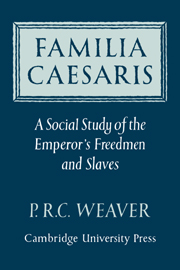Book contents
- Frontmatter
- Contents
- Preface
- Abbreviations
- INTRODUCTION
- PART I NOMENCLATURE AND CHRONOLOGY
- PART II THE FAMILY CIRCLE
- 5 Age at manumission
- 6 Age at marriage
- 7 Status of wives
- 8 Status of children
- 9 The Senatusconsultum Claudianum and the Familia Caesaris
- 10 Women in the Familia Caesaris
- 11 The marriage pattern of slaves and freedmen outside the Familia Caesaris
- PART III THE EMPEROR'S SERVICE
- APPENDIXES
- Bibliography
- Index
8 - Status of children
Published online by Cambridge University Press: 07 October 2011
- Frontmatter
- Contents
- Preface
- Abbreviations
- INTRODUCTION
- PART I NOMENCLATURE AND CHRONOLOGY
- PART II THE FAMILY CIRCLE
- 5 Age at manumission
- 6 Age at marriage
- 7 Status of wives
- 8 Status of children
- 9 The Senatusconsultum Claudianum and the Familia Caesaris
- 10 Women in the Familia Caesaris
- 11 The marriage pattern of slaves and freedmen outside the Familia Caesaris
- PART III THE EMPEROR'S SERVICE
- APPENDIXES
- Bibliography
- Index
Summary
The terms used to refer to children and to express parental relationships are the same for children of all classes and status. It makes no difference whether they or their parents are slave, freed, or fteeborn; filius, filia, pater, mater, parens, etc., and their Greek equivalents, are basic. More rarely used are: liberi, infans, delicium, mama, or even a periphrasis, e.g. ‘duo incrementa’ (VI 8984). The one point of nomenclature with any chronological significance is the form of abbreviation for ‘films’ which shows a development from ‘f(ilius)’ to ‘fil(ius)’ similar to that for ‘libertus’ from ‘l(ibertus)’ to ‘lib(ertus)’. As with the status of wives, it is best to approach the naming and status of children in two sections according to the status of the father.
CHILDREN OF CAESARIS SERVI
It is convenient to begin with the children of the Imperial slaves because in these cases the status of the father at the time of the birth of the children is positively known. All these unions are strictly contubernium and hence the status of the children should in all normal cases be determined by that of the mother at the time of birth of the child, in accordance with the principle of the ius gentium. Using the same groups of Imperial slave fathers as we used in the previous discussion for slave husbands (i.e. Rome, Italy and the provinces), we may proceed within these groups on the basis of the mother's status.
- Type
- Chapter
- Information
- Familia CaesarisA Social Study of the Emperor's Freedmen and Slaves, pp. 137 - 161Publisher: Cambridge University PressPrint publication year: 1972



